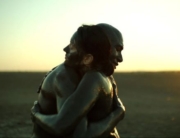If being unique and outside of the box were all that Computer Chess had going for it, it wouldn’t have been my favorite movie out of Sundance 2013. Fortunately, it has lots more. Andrew Bujalski’s latest is, yes, a feat of originality in its mockumentary format, recorded on retro Sony Portapak black-and-white video. At the same time, though, almost every moment is a surprise, and one never knows what zany character or weird plot maneuver lurks around the corner. Bujalski’s intelligent humor permeates each remarkable scene—mostly improvised. (Bujalski has ironically written scripts for all of his previous films, despite the perceptions of constant improvisation in mumblecore, the movement of which he is largely attributed as a founding father.)
“You’ve never seen video like I’ll show you,” he jokingly told the Los Angeles Times, referring to the detractors who wondered why all his previous films were shot on 16mm. The flat, low contrast, degraded image is a bold choice for the story of a group of computer chess programmers at a convention in the early 1980s. We move throughout the complex twists and turns that invariably occur when a large gathering of nerds is placed in the same hotel for a long weekend enduring the stress of a competitive tournament. (The prize for the winning computer program: a match against the foremost American human chess player: a chance to prove the superiority of the programming mind over the human performer.)
The ensemble, a remarkable mix of indie stalwarts, fellow filmmakers, and non-traditional actors, is satisfactorily weird. The movie features Wiley Wiggins of Dazed and Confused and The Waking Life fame, while the animator of the latter, Bob Sabiston, also appears. Film critic Gerald Peary plays a role, and a host of filmmakers, friends, and actual computer programmers also populate the episodic scenarios. Despite the complete strangeness of the setting and its inhabitants, a feeling of familiarity is impossible to escape. Bujalski has recreated a world we probably know next to nothing about yet feel perfectly informed of its subtleties. It’s a huge feat, and it comes in the form of an utterly stupendous and hip presentation (as in “hip to be square”).
For anyone expecting a Revenge of the Nerds update, you won’t be completely disappointed, yet the humor is far more resonant and sophisticated. The setups are as ham-fisted as any ’80’s teen comedy (one man can’t afford a hotel room and tries to beg his way into staying with the other programmers, for instance), but they are colored by Bujalski and his collaborators’ intelligent and specific tastes. The film, at times, can be a depiction of the relationship between human and machine, but make no mistake, there’s no way a human didn’t come up with this one.







Leave A Comment